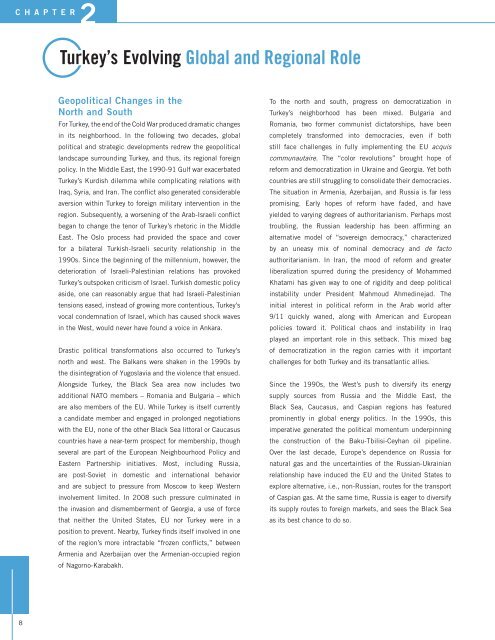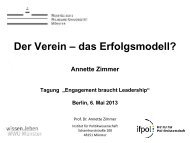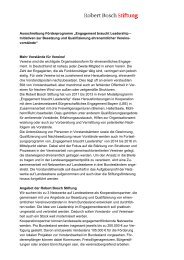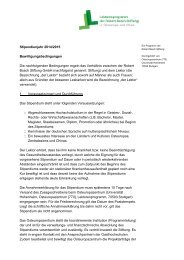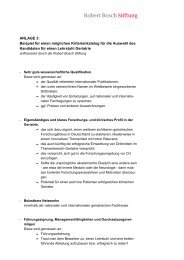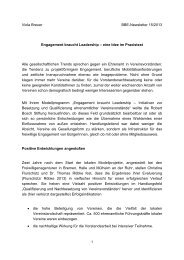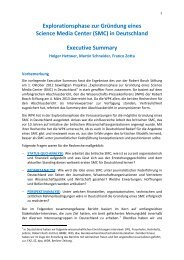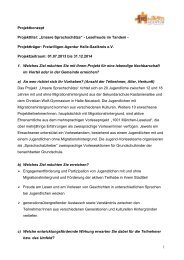Turkey, Its Neighbors and the West - Robert Bosch Stiftung
Turkey, Its Neighbors and the West - Robert Bosch Stiftung
Turkey, Its Neighbors and the West - Robert Bosch Stiftung
Create successful ePaper yourself
Turn your PDF publications into a flip-book with our unique Google optimized e-Paper software.
C H A P T E R 2<br />
8<br />
<strong>Turkey</strong>’s Evolving Global <strong>and</strong> Regional Role<br />
Geopolitical Changes in <strong>the</strong><br />
North <strong>and</strong> South<br />
for <strong>Turkey</strong>, <strong>the</strong> end of <strong>the</strong> Cold War produced dramatic changes<br />
in its neighborhood. In <strong>the</strong> following two decades, global<br />
political <strong>and</strong> strategic developments redrew <strong>the</strong> geopolitical<br />
l<strong>and</strong>scape surrounding <strong>Turkey</strong>, <strong>and</strong> thus, its regional foreign<br />
policy. In <strong>the</strong> Middle east, <strong>the</strong> 1990-91 Gulf war exacerbated<br />
<strong>Turkey</strong>’s Kurdish dilemma while complicating relations with<br />
Iraq, syria, <strong>and</strong> Iran. The conflict also generated considerable<br />
aversion within <strong>Turkey</strong> to foreign military intervention in <strong>the</strong><br />
region. subsequently, a worsening of <strong>the</strong> arab-Israeli conflict<br />
began to change <strong>the</strong> tenor of <strong>Turkey</strong>’s rhetoric in <strong>the</strong> Middle<br />
east. The oslo process had provided <strong>the</strong> space <strong>and</strong> cover<br />
for a bilateral Turkish-Israeli security relationship in <strong>the</strong><br />
1990s. since <strong>the</strong> beginning of <strong>the</strong> millennium, however, <strong>the</strong><br />
deterioration of Israeli-palestinian relations has provoked<br />
<strong>Turkey</strong>’s outspoken criticism of Israel. Turkish domestic policy<br />
aside, one can reasonably argue that had Israeli-palestinian<br />
tensions eased, instead of growing more contentious, <strong>Turkey</strong>’s<br />
vocal condemnation of Israel, which has caused shock waves<br />
in <strong>the</strong> <strong>West</strong>, would never have found a voice in ankara.<br />
Drastic political transformations also occurred to <strong>Turkey</strong>’s<br />
north <strong>and</strong> west. The balkans were shaken in <strong>the</strong> 1990s by<br />
<strong>the</strong> disintegration of Yugoslavia <strong>and</strong> <strong>the</strong> violence that ensued.<br />
alongside <strong>Turkey</strong>, <strong>the</strong> black sea area now includes two<br />
additional naTo members – romania <strong>and</strong> bulgaria – which<br />
are also members of <strong>the</strong> eu. While <strong>Turkey</strong> is itself currently<br />
a c<strong>and</strong>idate member <strong>and</strong> engaged in prolonged negotiations<br />
with <strong>the</strong> eu, none of <strong>the</strong> o<strong>the</strong>r black sea littoral or Caucasus<br />
countries have a near-term prospect for membership, though<br />
several are part of <strong>the</strong> european neighbourhood policy <strong>and</strong><br />
eastern partnership initiatives. Most, including russia,<br />
are post-soviet in domestic <strong>and</strong> international behavior<br />
<strong>and</strong> are subject to pressure from Moscow to keep <strong>West</strong>ern<br />
involvement limited. In 2008 such pressure culminated in<br />
<strong>the</strong> invasion <strong>and</strong> dismemberment of Georgia, a use of force<br />
that nei<strong>the</strong>r <strong>the</strong> united states, eu nor <strong>Turkey</strong> were in a<br />
position to prevent. nearby, <strong>Turkey</strong> finds itself involved in one<br />
of <strong>the</strong> region’s more intractable “frozen conflicts,” between<br />
armenia <strong>and</strong> azerbaijan over <strong>the</strong> armenian-occupied region<br />
of nagorno-Karabakh.<br />
To <strong>the</strong> north <strong>and</strong> south, progress on democratization in<br />
<strong>Turkey</strong>’s neighborhood has been mixed. bulgaria <strong>and</strong><br />
romania, two former communist dictatorships, have been<br />
completely transformed into democracies, even if both<br />
still face challenges in fully implementing <strong>the</strong> eu acquis<br />
communautaire. The “color revolutions” brought hope of<br />
reform <strong>and</strong> democratization in ukraine <strong>and</strong> Georgia. Yet both<br />
countries are still struggling to consolidate <strong>the</strong>ir democracies.<br />
The situation in armenia, azerbaijan, <strong>and</strong> russia is far less<br />
promising. early hopes of reform have faded, <strong>and</strong> have<br />
yielded to varying degrees of authoritarianism. perhaps most<br />
troubling, <strong>the</strong> russian leadership has been affirming an<br />
alternative model of “sovereign democracy,” characterized<br />
by an uneasy mix of nominal democracy <strong>and</strong> de facto<br />
authoritarianism. In Iran, <strong>the</strong> mood of reform <strong>and</strong> greater<br />
liberalization spurred during <strong>the</strong> presidency of Mohammed<br />
Khatami has given way to one of rigidity <strong>and</strong> deep political<br />
instability under president Mahmoud ahmedinejad. The<br />
initial interest in political reform in <strong>the</strong> arab world after<br />
9/11 quickly waned, along with american <strong>and</strong> european<br />
policies toward it. political chaos <strong>and</strong> instability in Iraq<br />
played an important role in this setback. This mixed bag<br />
of democratization in <strong>the</strong> region carries with it important<br />
challenges for both <strong>Turkey</strong> <strong>and</strong> its transatlantic allies.<br />
since <strong>the</strong> 1990s, <strong>the</strong> <strong>West</strong>’s push to diversify its energy<br />
supply sources from russia <strong>and</strong> <strong>the</strong> Middle east, <strong>the</strong><br />
black sea, Caucasus, <strong>and</strong> Caspian regions has featured<br />
prominently in global energy politics. In <strong>the</strong> 1990s, this<br />
imperative generated <strong>the</strong> political momentum underpinning<br />
<strong>the</strong> construction of <strong>the</strong> baku-Tbilisi-Ceyhan oil pipeline.<br />
over <strong>the</strong> last decade, europe’s dependence on russia for<br />
natural gas <strong>and</strong> <strong>the</strong> uncertainties of <strong>the</strong> russian-ukrainian<br />
relationship have induced <strong>the</strong> eu <strong>and</strong> <strong>the</strong> united states to<br />
explore alternative, i.e., non-russian, routes for <strong>the</strong> transport<br />
of Caspian gas. at <strong>the</strong> same time, russia is eager to diversify<br />
its supply routes to foreign markets, <strong>and</strong> sees <strong>the</strong> black sea<br />
as its best chance to do so.


